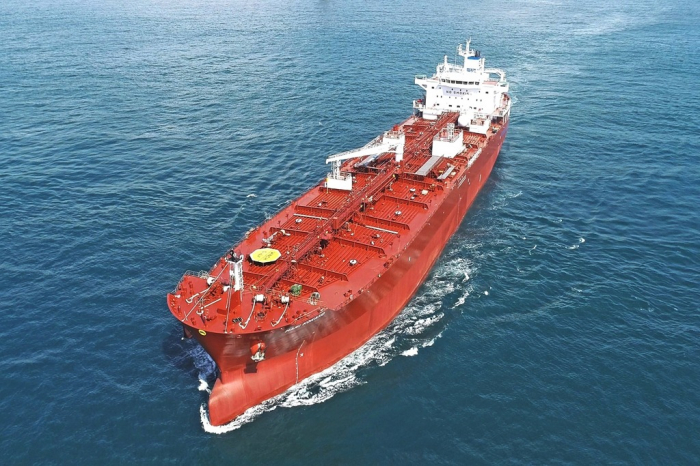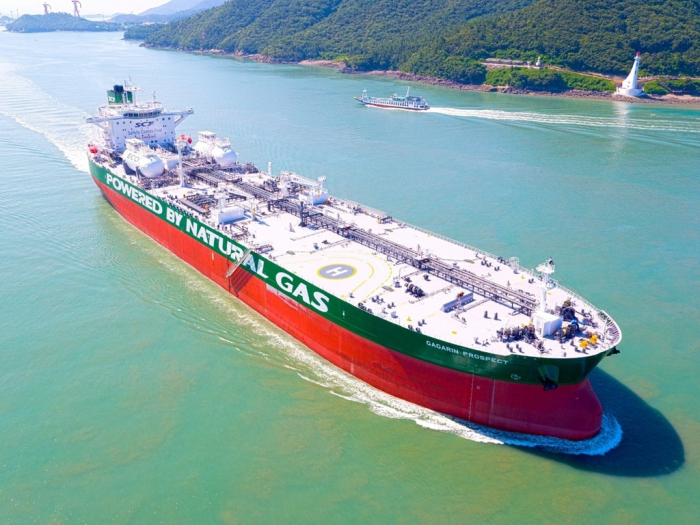Shipping & Shipbuilding
S.Korean shipbuilders rule world’s eco-friendly vessel market
KSOE wins 19 of 24 ship deals so far this year for eco-friendly vessels; demand for the pricey vessels is expected to surge
By Feb 14, 2023 (Gmt+09:00)
3
Min read
Most Read
LG Chem to sell water filter business to Glenwood PE for $692 million


Kyobo Life poised to buy Japan’s SBI Group-owned savings bank


KT&G eyes overseas M&A after rejecting activist fund's offer


StockX in merger talks with Naver’s online reseller Kream


Mirae Asset to be named Korea Post’s core real estate fund operator



South Korea’s shipbuilders have won more than half of the orders to build eco-friendly vessels so this year based on advanced technology to dominate the global market with rapid growth and higher values thanks to tougher environmental regulations.
Hyundai Samho Heavy Industries Co., a unit of the world’s top shipbuilder Hyundai Heavy Industries Group, and HJ Shipbuilding & Construction Co. said on Tuesday they secured deals worth 1.4 trillion won ($1.1 billion) in total from HMM Co., the country’s largest container line, to manufacture nine 9,000 twenty-foot equivalent unit (TEU) ships powered with methanol. Hyundai Samho is set to build seven of the container ships and HJ Shipbuilding will produce the remaining two.
The country’s shipbuilders have won deals to build 29 eco-friendly vessels so far this year. Hyundai Samho secured contracts to produce 19 methanol-fueled ships and two liquefied natural gas-powered vessels. Its affiliate Hyundai Heavy Industries Co. and a major rival Samsung Heavy Industries Co. both won orders to manufacture two ships each with LNG engines. Daewoo Shipbuilding & Marine Engineering Co. also inked a deal to build such a ship.
The country’s top three shipbuilders – Hyundai Heavy, Daewoo and Samsung – bagged orders to manufacture 187 eco-friendly ships last year out of deals for such 548 vessels in total last year.
In the methanol-powered vessel sector, Korea Shipbuilding & Offshore Engineering Co. (KSOE), Hyundai Heavy Industries Group’s intermediate holding company, dominated the market as it won deals to build 54 vessels, more than half of the total deals for 99 ships so far.
“We will rule the eco-friendly vessel market with all our efforts in research and development based on differentiated technology,” said KSOE Vice Chairman and CEO Ka Sam-hyun.
RISING DEMAND
The International Maritime Organization (IMO) is toughing environmental regulations. The United Nations body aims to reduce carbon emissions by 40% compared to 2008 for ships ordered from 2030 and by 70% by 2050.
Such goals ramped up orders for overall eco-friendly ships with deals to build such ships up 42% last year as the global shipping industry rushed to prepare for the tougher regulations.
“Only 6.8% of vessels operated by the world’s six largest shipping lines including Maersk and MSC (Mediterranean Shipping Co.) are eco-friendly,” said Lee Bong-jin, an analyst at Hanwha Investment & Securities Co. in Seoul. “To change 75% of total fleets to eco-friendly ships, the six majors will need to replace ships for 82 million DWT (deadweight tons) in total.”

Danish Maersk, the world’s top container shipping company, unveiled a goal to achieve net zero emissions in its business by 2040.
HMM’s latest contracts, its first orders for eco-friendly vessels, were also to meet the stricter emission standards.
“We aim to become a global top tier in the competitiveness battle for eco-friendly fleets caused by regulations on ship fuels by the European Union and others,” the company said. “The introduction of methanol-powered ships is a beginning.”
Orders for vessels with methanol-fueled engines accounted for 21% of total containership contracts in 2022.
Demand for methanol-powered vessels is growing as they cut sulfur oxide (SOx) by up to 99%, nitrogen oxide (NOx) by 80% and greenhouse gas by 25%, compared to ships with engines using fuel oil. The eco-friendly vessels are valued higher with prices of 9,000 TEU models averaging at some $124 million, about 15% more than traditional ones, as they need advanced technology.
PICKY ON ORDERS
South Korean shipbuilders, which have already secured backlogs for the next three years, are focusing to win contracts for high-value-added eco-friendly vessels including those with methanol-powered engines while lowering their total order targets for this year.
“Docks have recently been filled with eco-friendly vessels, which use LNG and methanol as shipbuilders bid mainly for high-value-added ships,” said an industry source.
KSOE has secured deals to build 19 eco-friendly ships out of total orders for 24 ships so far this year.
The company reportedly even set order conditions that require buyers to adopt its automatic operation technology for those ships, given the strong demand, according to industry sources.
Write to Jae-Fu Kim at hu@hankyung.com
Jongwoo Cheon edited this article.
More to Read
-
 Business & PoliticsTrump Jr. meets Korean business chiefs in back-to-back sessions
Business & PoliticsTrump Jr. meets Korean business chiefs in back-to-back sessionsApr 30, 2025 (Gmt+09:00)
-
 Korean chipmakersSamsung in talks to supply customized HBM4 to Nvidia, Broadcom, Google
Korean chipmakersSamsung in talks to supply customized HBM4 to Nvidia, Broadcom, GoogleApr 30, 2025 (Gmt+09:00)
-
 EnergyLS Cable breaks ground on $681 mn underwater cable plant in Chesapeake
EnergyLS Cable breaks ground on $681 mn underwater cable plant in ChesapeakeApr 29, 2025 (Gmt+09:00)
-
 Business & PoliticsUS tariffs add risk premium to dollar assets: Maurice Obstfeld
Business & PoliticsUS tariffs add risk premium to dollar assets: Maurice ObstfeldApr 29, 2025 (Gmt+09:00)
-

Comment 0
LOG IN


